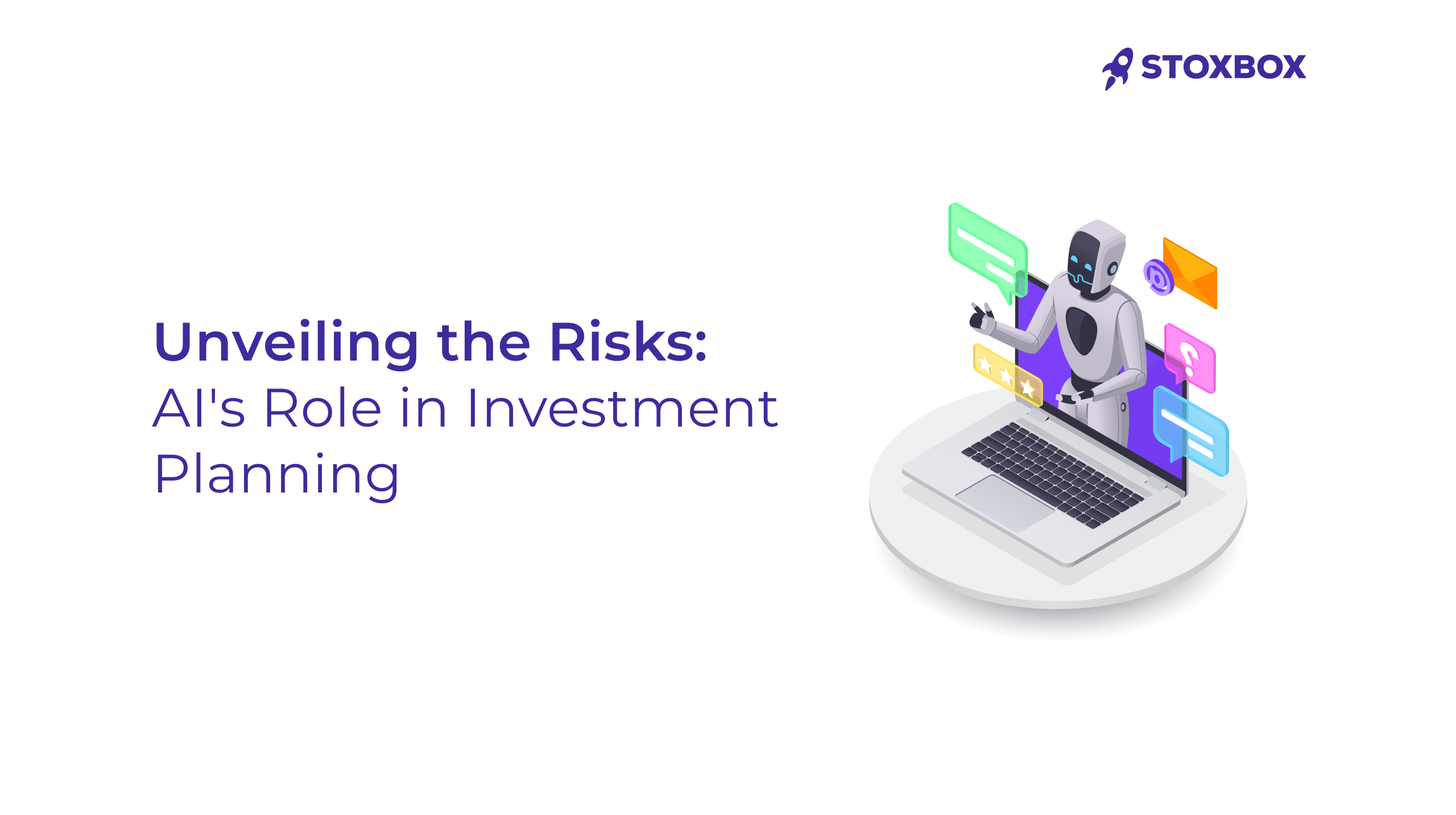AI & Investment Planning: All You Need to Know
The finance world has not been the same. It is key to know that Artificial Intelligence (AI) has had a part to play. The way we plan our investments, manage our tasks, and make sense of complex data—it has changed everything. It’s quite exciting to see that this is happening all over the world.
AI is doing a lot for the finance industry. It automates mundane jobs and scans through massive heaps of data, extracting useful insights that will help investors. This means that investors now have access to up-to-date insights backed by a great deal of information, something that was hard to do before. However, like everything that is new and mighty, using AI in finance does not come without its problems, particularly when money is involved.
The Indian stock market is full of opportunities and challenges, and AI is a potential game-changer for investors who are in this dynamic landscape. But before you blindly trust a robot advisor with your hard-earned money, let us get a hold of the possible benefits and the hidden risks associated with AI in stock picking.
The AI Revolution in Investment
Investment planning is now seeing a new landscape.
Why is that?
AI, through algorithms and machine learning models, is capable of predicting market trends and giving personalised investment advice. So, today, Indian investors can access tools operating on real market data, which makes it possible for them to get insights that are otherwise challenging or beyond human analysis.
Some of the key benefits are:
Automated Portfolio Management: AI-driven platforms can adjust to market changes quite quickly, which makes it easier for them to manage diversified portfolios.
Market Prediction: AI leverages historical data and predicts future market movements. However, there is always the inherent uncertainty of financial markets.
Personalised Investment Strategies: Whatever your financial goals and risk tolerance, AI algorithms can offer tailored investment plans.
However, keep in mind always that there are risks when you rely on AI for investment planning.
What are the risks involved in AI investments?
These risks can range from technical glitches to ethical and privacy concerns, all of which have the potential to impact an investor’s portfolio.
Algorithmic Biases and Errors: AI systems will only perform as well as the information on which they have been trained. If the data is poor or biased, it can cause wrong predictions, leading to wrong investment decisions. Additionally, errors in the algorithm are rare, but they may trigger sudden losses. Being vigilant is essential.
Overreliance on Technology: AI-driven investment platforms can be super convenient. There is a chance that investors can become more reliant than necessary on these platforms and less involved in their investment strategies. They may overlook risks or opportunities that AI can miss.
Security and Privacy Concerns: AI systems process huge amounts of personal and financial data. While this is quite helpful, it also raises privacy and security concerns. Sensitive information may be made public through data breaches, and market prices for particular securities may be manipulated by unauthorised access to investment algorithms.
Regulatory and Ethical Considerations: AI in finance also comes with many regulatory and ethical considerations. In India, the financial regulations keep evolving based on the advancements in technology. There exists a grey area on many fronts—including decision-making by AI, accountability, and transparency.
How Investors Can Navigate AI Investment Risks
Despite its risks, AI surely has enormous potential for making investment strategies better. There are numerous ways that investors can limit risks while profiting from this technology to make the right choices.
Stay Informed and Engaged: Investors should take efforts to understand the basics of AI and how it is applied in the tools they use. Understanding your investment strategy and the underlying technology provides insight into associated risks and benefits.
Diversify Investment: The primary factor to consider is diversification, which reduces the effect of poor performance of one investment. This also applies to using an AI-driven platform because it helps mitigate associated risks that could arise from either algorithmic malfunction or market volatility.
Understand the Data: Data is very important when it comes to AI’s market predictions. So, getting to know the sources that these AI tools use can be beneficial to investors. When data sources are reliable, unbiased, and comprehensive, they contribute to a more accurate market analysis.
Prioritise Security: Investors should make sure that the AI-driven investment platforms they use make data security and privacy a priority, abiding by the latest standards. This makes them safe against data breaches and unauthorised access.
Monitor Regulatory Changes: The regulatory landscape of AI in finance continues to evolve. Understanding the changes in regulations could be a very good means for investors to cut through the legal complexities and adapt to new standards.
The Allure of AI: A Data-Driven Ally for Indian Investors
To Indian investors, AI has a number of compelling propositions:
Decoding Data: AI algorithms will sort through the mountains of financial data—company reports, news articles, social media sentiment, and regulatory filings—at lightning speeds. That means an understanding of market forces that is more detailed than traditional analysis relying on human interpretation.
Pattern Recognition: AI is excellent at finding minute patterns and hidden correlations within large volumes of financial data. Such links may unveil promising investment opportunities that might be missed if analyzed conventionally. Just think about discovering an undervalued gem before anyone else in the market!
Emotionless Investing: We’ve all been there, making spur-of-the-moment investment decisions either by gut feeling or FOMO. AI, having no emotions, will analyze the stocks based on their predefined parameters with no emotional interference. This keeps investors on track with their long-term investment goals and helps avoid making costly emotional mistakes.
24/7 Market Guardian: AI-powered tools have the ability to monitor the market constantly and send alerts to investors in real time whenever there is a change in stock price, announcements of news, or market sentiments. This will help investors be quick if there’s new opportunities or imminent risks and give them an edge over other players.
In the Indian stock market, which is always plagued by information overload and complex data analysis, these are big advantages. AI promises to simplify investment insights and dig out those hidden gems that always escape traditional models.
Humans and AI: A Dream Team for Investment Success?
AI has many pitfalls. So, depending on AI alone for investment decisions in the Indian market is not very wise. It’s all about making the most of both humans and AI. Let’s know more:
AI: It is about time you let your AI tools handle heavy lifting in the world of data analysis. AI tools process large volumes of data and can sort through them for potential investment opportunities that meet predefined criteria. You now have more time to pay attention to more important aspects like portfolio management and risk assessment.
You: Let your financial acumen, risk tolerance, and view of the Indian market come into play to evaluate recommendations provided by AI. Don’t blindly follow the robot’s advice. Analyse the underlying reasons for recommendations, consider your goals for investment, and make informed decisions.
Human Oversight for Ethical AI: It is the human beings who must lead the way in developing and executing artificial intelligence, making sure that all practices adopted are ethical and integrity is not compromised by algorithms. There needs to be active monitoring and adjustment of AI models so that potential biases are removed and there are no skewed investment recommendations.
What lies ahead…
AI technology is only going to evolve further. The Indian financial sector can expect much more advanced AI-powered investment solutions. There are some things that are needed to ensure responsible AI integration:
Transparency in AI Development: Financial institutions and technology providers should be transparent about how AI algorithms are trained. This means knowing the source of underlying data, decision processes of algorithms, and possible limitations of the technology.
Regulation for AI in Finance: The Indian regulators, SEBI, need to come out with more clear instructions related to the development and deployment of AI in the financial sector. They must find the right balance between the protection of investors and the use of AI responsibly to instill trust in the technology.
Investor Education: Investors will need to deeply know the capabilities and limitations of AI-powered investment tools. Understanding how AI works along with its potential benefits and risks gives investors the right information and the ability to choose the correct AI platforms.
A Symbiotic Relationship for Investment Success
While AI may hold great potential in the Indian stock market, the consideration of risk associated with the technology has to be out there. Thus, approaching investment prospects collaboratively—where the ability and capacity of humans are combined with those of AI—will help navigate the market better. Investors, however, should be skeptical about the limitations and ethics of AI.
As AI takes root in the Indian financial industry, we can look toward a future wherein AI stands as a worthy partner and enabler to the investor in making thoughtful choices and attaining their long-term financial goals. We must remember that the Indian stock market is a beast, and AI or no AI, there is no sure-shot route to tills of gold.
Your Wealth-Building Journey Starts Here

